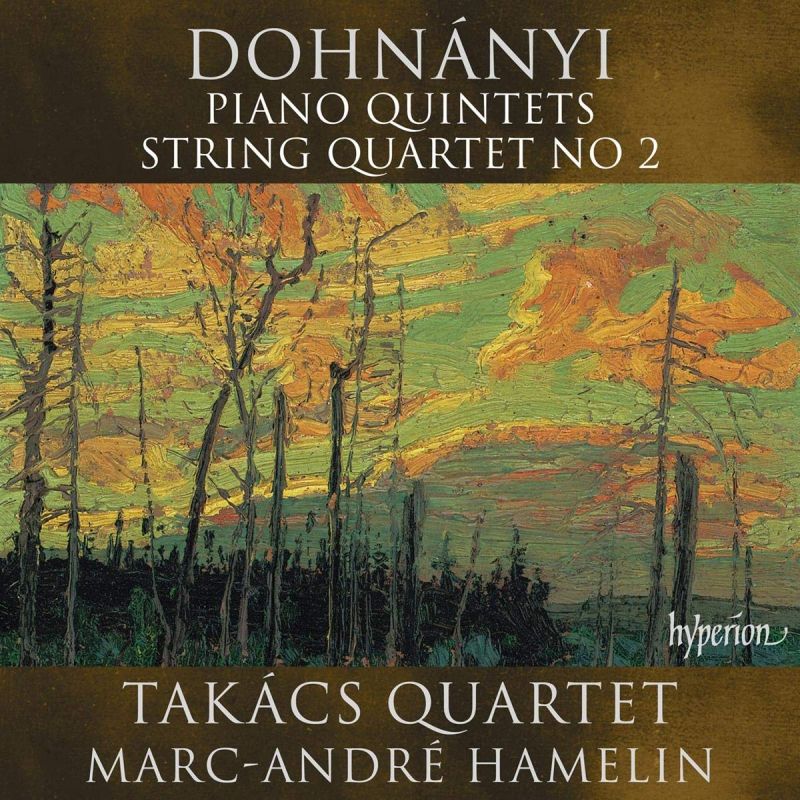DOHNÁNYI Piano Quintet. String Quartet No 2
View record and artist detailsRecord and Artist Details
Composer or Director: Ernö Dohnányi, Marc-André Hamelin
Genre:
Chamber
Label: Hyperion
Magazine Review Date: 11/2019
Media Format: CD or Download
Media Runtime: 81
Mastering:
DDD
Catalogue Number: CDA68238

Tracks:
| Composition | Artist Credit |
|---|---|
| Quintet for Piano and Strings No. 1 |
Ernö Dohnányi, Composer
Ernö Dohnányi, Composer Marc-André Hamelin, Composer Takács Quartet |
| String Quartet No. 2 |
Ernö Dohnányi, Composer
Ernö Dohnányi, Composer Takács Quartet |
| Quintet for Piano and Strings No. 2 |
Ernö Dohnányi, Composer
Ernö Dohnányi, Composer Marc-André Hamelin, Composer Takács Quartet |
Author: Michelle Assay
Even the most fiery preachers cannot make the First Quintet sound much more than it is: a solid academic work of a fine, talented 17-year-old student. Early critics put their finger on the influence of Schumann and Brahms here, and it is no surprise that the piece received Brahms’s seal of approval. There are already some fine accounts out there, including one from the Takács in an earlier incarnation – only the cellist remains in the ensemble today – alongside András Schiff on Decca. That version, however, suffers from poor microphone placing and murky sound. This new one is finely recorded, and I particularly enjoyed Hamelin and the Takács’s playful portrayal of the 5/4 finale, which could easily sound banal.
Hardly experimental but far more individual is the Second Quintet, composed almost two decades later. From the haunting opening bars to the otherworldly ending, with all Dohnányi’s typical cyclic traits along the way, this certainly makes a case for canonic status. Hamelin and the Takács bring a remarkable breadth of conception to bear, not just within each movement but across the entire work. They allow every passionate detail to come across yet preserve a sense of nobility and innate grace that I always associate with Dohnányi. By comparison the Schubert Ensemble on Hyperion are sleek enough but short of unstoppable energy. Gottlieb Wallisch and the Enso¯ Quartet on Naxos are a great budget choice, but again are no match for the overall urgency of Hamelin/Takács or, in particular, for the lilt they bring to the second movement. More comparable in quality are Roscoe and the Vanbrugh Quartet, who are also a fraction tighter in their tempos in all movements; but I do prefer the balance of the new recording and the magical warmth of Hamelin’s piano sound.
Interspersing the two quintets with Dohnányi’s Second String Quartet rather serves to reveal how much he depended on the piano to fire his imagination. For all the Takács’s sensitivity and full-blooded enthusiasm, it’s hard not to recall that Bartók’s First Quartet was just three years away and in a different league in terms of imaginative harmony, texture and structure. Still, this is an eminently collectable disc, certainly, but not only, for existing Donányi aficionados.
Discover the world's largest classical music catalogue with Presto Music.

Gramophone Digital Club
- Digital Edition
- Digital Archive
- Reviews Database
- Full website access
From £8.75 / month
Subscribe
Gramophone Full Club
- Print Edition
- Digital Edition
- Digital Archive
- Reviews Database
- Full website access
From £11.00 / month
Subscribe
If you are a library, university or other organisation that would be interested in an institutional subscription to Gramophone please click here for further information.




